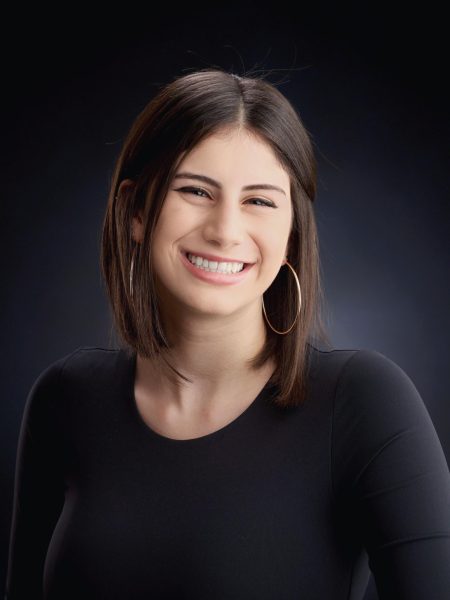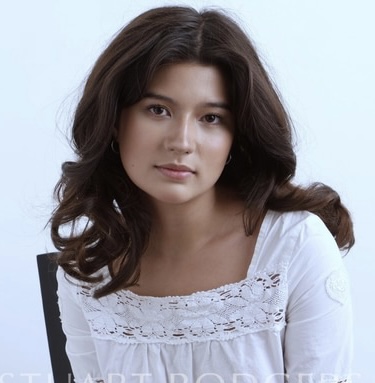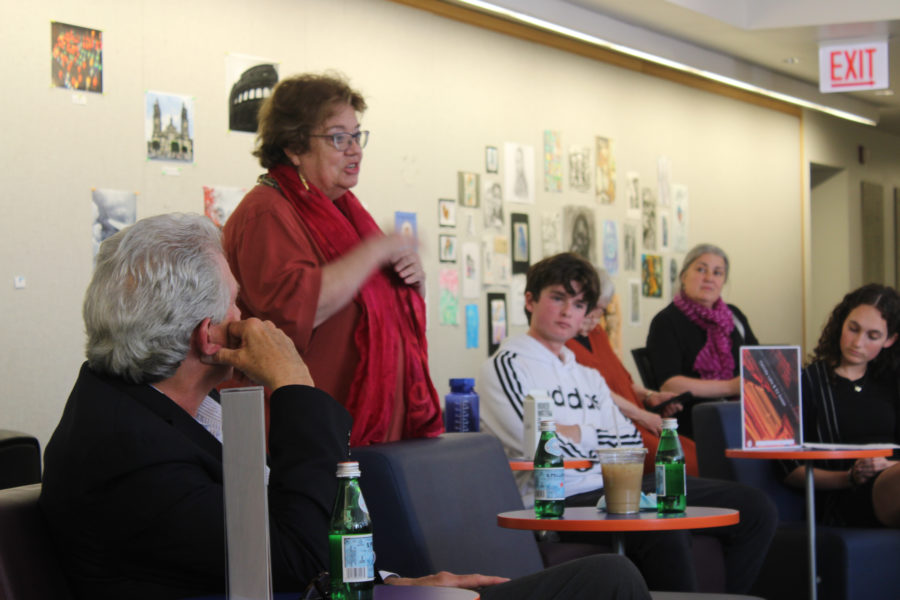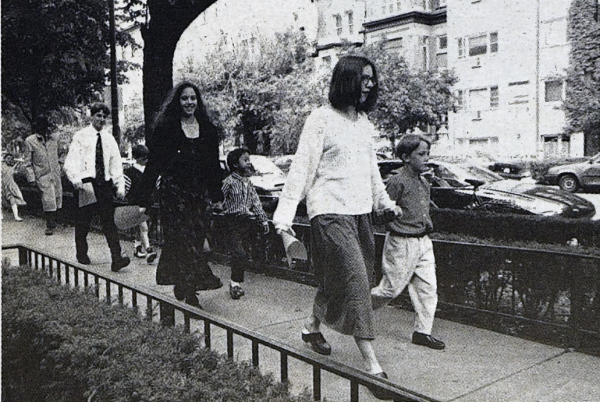Pollsters Unite For Civility: LIFE Speakers Encourage Civil Discourse
Celinda Lake and Ed Goeas spoke at the LIFE event last week to educate students on cynicism and polarization in political settings.
Latin’s Initiative for Ethics recently hosted Republican pollster Ed Goeas and Democratic pollster Celinda Lake to discuss their new book, A Question of RESPECT: Bringing Us Together in a Deeply Divided Nation, and to offer their insights on political polarization in society today.
A pollster is somebody who measures people’s opinions and reactions to campaigns, messages, advocacy, and current events. They look at how to draw the sample, ask questions, and interpret the results. They make phone calls and send lots of texts messages and emails to ensure they have a broad sampling of data.
Ms. Lake said, “I think what Ed and I both like a lot is that it’s really part of a democracy in our minds. It’s bringing the voice of the people to the powerful. We feel that’s an important thing to do and figuring out how to be for change that people want and how to talk about it.”
In case you were unable to attend the Q&A with Ms. Lake and Mr. Goeas, here is a sample of what they spoke about.
Eliza Lampert: You spoke about political polarization in communities at Latin. How do you work together to try to eliminate that idea and be a more together community and country?
EG: I guess the first thing I’d like to say is the thing that’s always been so comfortable with Celinda is she kind of joins me in leading by example. We saw that from the very beginning. Some of it came structurally in the way that we created the battleground survey where we did analysis separate from each other and came to respect each other’s analysis rather than constantly focusing on countering the analysis. It’s just built from there. There’s been so many times where the relationship has been kind of fun to watch. Others that see it just become so puzzled it’s almost disarming.
CL: I think the other thing that really helped us was we have a lot of the same core values. I started out as a Republican, Ed started out as a Democrat, and we both switched parties. We obviously have lots of family members in the other party, so that’s always given us a lot of respect for each other and for both parties.
EL: Can you tell me about your book? What inspired it? How did the process work? Was this your first book?
CL: Ed really deserves the credit, and he’ll tell you about that story. I have written another book actually with a Republican pollster Kellyanne Conway, Trump’s pollster, called What Women Really Want. I really love working together because I think people agree on a lot more things than they disagree on, and particularly on a fundamental level. Two things that were really important about this book, and Ed will elaborate on this one, it was founded in interacting with young people in a seminar that Ed was teaching. Throughout this book, and now we’re still teaching a class at Georgetown, we’ve been really really influenced by young people and young leadership and young people picking this up. Secondly, we wrote about the problem in the “we” voice and the solution in the “I” voice. Because we didn’t always agree on the solutions. We agreed we need solutions, and maybe there are new ones you would come up with, Eliza, and compromises, etc.
EG: So I started with a fellowship in 2018 on civility. I did come out of that thinking that the youth was going to be a major part of our future on turning this around. That has only deepened as we have written the book and looked at more and more things that the youth has got to be the future. It’s interesting, I’m sitting here right now, Celinda knows, I said I was going to do this last week, ordering a granite plaque for each of the people in our class with the “Man in the Arena” quote from Theodore Roosevelt, which is about being in the arena, not the cynics who could have sat on the outside. I’m doing it, hopeful that we have seen some real talent in these youth and that this class will be an inspiration. In the beginning, none of them necessarily said they wanted to go into politics, and I think I sensed a change in that through the semester.
EL: You talk about your solution and the youth being the future for that solution. Can you explain to me on a more specific level how you’re portraying that to the youth in your class and beyond?
EG: First of all, the book is dedicated to John McCain. I grew up with the slang word “Army brat.” My father was in the military my entire youth. John McCain was always a hero in our family. My dad went to Vietnam twice, and John McCain was there in prison both times my father was there. I saw a lot of that he dealt with in terms of constantly reaching out with respect, treating people with respect, and civility. It got tough sometimes. I find he was a man that because of his experience in Vietnam, he had witnessed the worst in humanity, and he made a conscious effort constantly to go the other direction. When I did the fellowship, I sensed coming out [students] learned a lot through the discussions, not just from me, but through the discussions. They gave me a sense of hope that they were willing to show a commitment to do things differently. Say things differently. To come across more civilly. And that gave us hope. I think the surprise we had was when we finished the first nine chapters, and we went to looking at the youth, there was one, and Celinda says it more diplomatically, but basically what I heard from all the youth, college educated, not college educated, is, I’ll show someone else respect if they show it to me first. And I believe the world doesn’t go that way. So that’s what put us on the path of the second part of the solution: needing leaders that will lead the way for those young people. To see that being the nice guy, rather than being the jerk, is beneficial. Treating people with respect is a good way of getting back to a more civil country. I think this country kind of misses that. The fact that this book became a bestseller in three weeks tells me that there is a real market for turning back to niceness in this country. People are kind of tired of all the meanness.
CL: I think Ed said it beautifully. What we found, and I appreciate the origin of it, is a lot of young people saying I’m not going to respect someone if they don’t respect me. If they deny my existence. I can appreciate where that comes from. Both of our beliefs, from slightly different origins, but the same foundational belief, Ed believes that you grant people respect as an American. I would put it slightly differently. You grant people respect as a human being. You can lose that respect very fast, but the way it has to work is you have to respect everyone, and respect is a foundational building block of trust. That was something that was really important for us. I think the heart and soul of the book is culturally and mechanically right now, there are so many things that are working, reinforcing and creating polarization and working against respect and that we have to start at that foundational value as we change the culture and the change the structures.
EG: I’m also a very strong believer in playing to people’s better angels, not dealing with everyone with cynicism. My experience has been, and I retired at the end of last year, my experience has been that if you play to people’s better angels, you’ll be surprised how many have those better angels.
EL: On the idea of respect, do you find that you work more often with people of the opposing party to poll and find this mutual respect?
CL: There are some structures that work against that. In our business, you have to pick a party to be aligned with. So there have been some Republican candidates when I have worked in other organizations, particularly pro-choice Republican women that I’ve worked for. But in the polling business, you have to pick one side or the other. What’s different for Ed and me is that we won’t just work for any Republican or any Democrat. We have criteria in our firm. Ed goes through an interview process. Because we want to believe in the people we are working for. And sometimes you make mistakes, of course. Both of us have done a lot of issue work bipartisanly, and I think our clients have really been richer for understanding here’s how Republicans might think about this, here’s how Democrats, here’s how Independents. If we’re going to build consensus around this policy, here’s how we have to approach it.
EG: The overwhelming majority of [my firm’s] work is campaigns, so we are only working with Republicans; we are not working jointly because you are campaigning against each other. On the issues, I would also say there’s been multiple times over the 30 years we’ve been working together that they’ve had a client that would like to have a Republican pollster or we’ve had a client that would like to have a Democratic pollster, and we bring them in. One of the things we always say is that we’re glad to present the data as many times as you want, but we’re not going to have it presented in a way other than how we analyzed it.
EL: Do you have anything that you want to add? Final concluding thoughts for youth, specifically the high school students and the Latin community?
CL: I think one of the biggest problems we have is not actually with youth, is not actually partisan polarization, but cynicism. They don’t believe you can make a difference and that’s why it was totally Ed’s idea, but I thought it was so cool when Ed came up with this idea of giving every student this quote, “You have to be in the arena.” One message I would have for the Latin School is you are such a group of talented people with so many opportunities and so much vision. I hope that your readership will get in the arena, because I know they will make a profound influence.
EG: Here’s what I’d add. We’ve had times in our country’s past where we’ve had polarization like this. And very often it has taken a catalyst to move people back from being there. I think people are getting tired of that environment. They’re just choosing to watch it less, which is not the answer, because that means you’re not involved in what’s happening. In the past, there has been a catalyst to pull you out of that. I see an opportunity here, because we’ve had this kind of slow build of civility that we have an opportunity here to feed that hunger for niceness and to approach it the same way. That’s going to take some leaders to light the way for the youth and for the youth to understand that they have a real opportunity here to in fact make things better.

Eliza Lampert (’24) is a senior at Latin and is overjoyed to serve as one of this year’s Editors-in-Chief. During her time writing for The Forum, she...

Lyla Granich (‘26) is honored to serve as one of the Editors-in-Chief this year. Through tending to the school's cultural body, she hopes to present...




















































